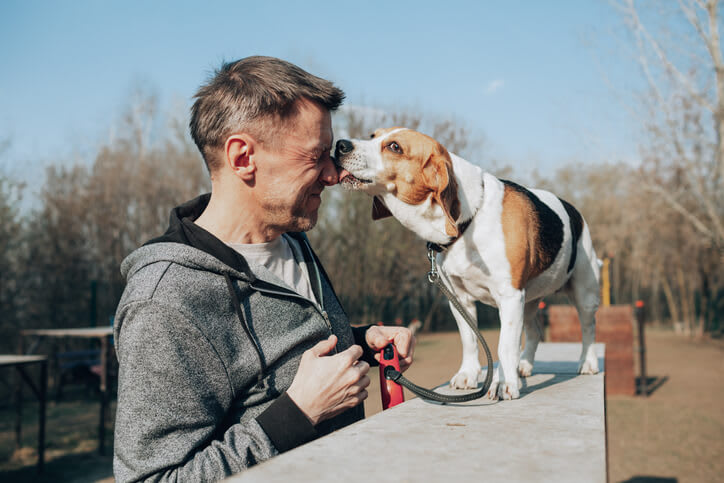Service Dogs for the Elderly: The Benefits of Service Dogs and How to Find Your Own Service Animal
- Service dogs can help older adults who have chronic illnesses or mobility issues live independently. Learn more about the benefits of service dogs for seniors and how to find a service animal to help you live independently.

What You Need to Know About Service Dogs for the Elderly
There are more than 500,000 service dogs in the United States. These smart, well-trained animals help Americans with disabilities and mobility issues to live safely. If you're considering getting a service dog for an elderly person to help them maintain a sense of freedom and independence, here's what you should know.
What Is a Service Dog?
Service dogs play an important role in helping people with impairments or disabilities to complete essential tasks and participate meaningfully in life. Unlike animals intended for companionship, service dogs aren't pets. They’re trained from a young age to perform specific jobs, based on what their handler requires.
Here are some of the jobs you might want a service dog for an older adult to perform:
- Safely guide visually impaired or blind people past obstacles and hazards
- Alert hearing-impaired or deaf people to doorbells, fire detectors, alarms and crying children
- Detect physical changes in a person with diabetes that can indicate a drop in blood sugar
- Protect owners susceptible to epileptic seizures by pressing alarm buttons to alert caregivers. They can also be trained to prevent injury by lying down next to their owner or breaking a fall.
- Support a person through episodes of post-traumatic stress or panic attacks
- Pull a wheelchair
- Open doors
- Retrieve objects
- Turn lights off and on
People with service animals are legally permitted to bring them to public places, such as government offices and businesses. There are also laws that allow service dogs in certain types of housing and on airplanes. Some states have laws related to emotional support animals, but these aren't the same as service dogs because they're not trained to perform a certain task.
How to Get a Service Dog for an Older Adult
Service dogs are recognized under the Americans With Disabilities Act (ADA). Your doctor can advise if you need a service dog and provide any medical documentation you may require.
There are many organizations that train service animals, but there's no official government certification process. It's important to ensure a service dog for an older adult is properly trained and reliable, so conduct thorough research to find a reputable program.
Are Service Dogs Covered by Medicare?
Service dogs are not covered by government insurance programs, such as Medicare or Medicaid.
Can Any Dog Be a Service Dog for Seniors?
Service dogs receive extensive training, usually beginning with socialization when they’re eight weeks old. Formal training may start when they're a year to 18 months old. However, the ADA doesn't require dogs to be trained by a service dog organization. If you prefer, you may train an animal to perform required tasks yourself, but it must be fully trained before it can be taken into public places as a service dog.
According to the American Kennel Club, the most common breeds of guide dogs are German shepherds, golden retrievers and Labrador retrievers. People with allergies can opt for a standard poodle. Service dog organization take a person's specific needs and a dog's personality into consideration when matching animals to owners.